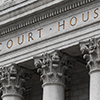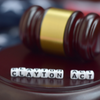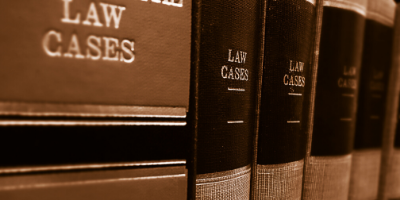Quarterly Journal Volume 51, Issue 3
In This Section
 QJ 51.3 - State Anti-Troll Statutes at the Federal Circuit. or Not.
QJ 51.3 - State Anti-Troll Statutes at the Federal Circuit. or Not.
Paul R. Gugliuzza
The Federal Circuit recently received notices of appeal in two cases raising questions about the constitutionality of state statutes prohibiting bad faith assertions of patent infringement. The cases could give the Federal Circuit an opportunity to clarify whether, or to what extent, state “anti-troll” statutes can be used to police how owners of federal patents allege infringement. But, as this essay shows, it’s not clear the Federal Circuit will actually decide the cases on the merits, both because the appeals may be premature and because one of the appeals may belong in the Ninth Circuit, not the Federal Circuit. If the Federal Circuit does issue a ruling on the merits, it may be because the preemption and federalism issues raised by the cases are too interesting and important to let doubts about jurisdiction get in the way.
 QJ 51.3 - Will Current Obviousness-Type Double Patenting Jurisprudence Discourage Use of the Patent System?
QJ 51.3 - Will Current Obviousness-Type Double Patenting Jurisprudence Discourage Use of the Patent System?
Maria A. DeCicco RePass
The judicially created doctrine of obviousness-type double patenting (“ODP”) aims to prevent improper timewise extension of a patent term by issuance of a second patent with claims that are not “patentably distinct” from the claims of the first patent, which would impermissibly extend the inventor’s limited monopoly. On its face, the basic rationale for the doctrine seems firmly grounded in principles of equity and fairness and in line with the long-standing bargain that is foundational to the patent system. But as with any judicially created doctrine, the application and applicability of ODP has evolved and expanded over time leading to both inconsistency and unpredictability. The purpose of the U.S. patent system, “[t]o promote the Progress of Science and useful Arts…,” is enshrined within the U.S. Constitution. It is therefore under that lens that any judicially made doctrine should be routinely evaluated to ensure that it is applied in furtherance of this purpose rather than to its detriment or in a way that creates unintended consequences. This note examines whether the modern application of, and jurisprudence concerning, the doctrine of ODP furthers the original goals of strengthening the U.S. patent system or if its application has deviated too far, leading to the opposite effect— creating a barrier to prospective inventors and discouraging use of the patent system in the US.
 QJ 51.3 - NFTs From a U.S. And European Trademark Perspective: Uncertainties and How to Best Approach Them
QJ 51.3 - NFTs From a U.S. And European Trademark Perspective: Uncertainties and How to Best Approach Them
Adrienne Hennemann
The digital economy is growing fast. While the notion metaverse is currently widely used, its concrete shape and use remains unclear. Non-Fungible Tokens (“NFTs”) are already on the market, but the real-world use remains to be seen. The legal world became interested in how NFTs, if at all, fit into the existing legal framework. This piece concludes that NFTs are here to stay but that it is unlikely that trademark laws will be amended to include NFTs. Rather, courts will apply traditional trademark law doctrines to NFTs. Certainty has increased when it comes to registration of NFTs. However, there remain numerous questions, particularly when it comes to potential counterarguments raised by third parties that are creating NFTs by using the trademarks of the trademark owner. Even if to date all court decisions were rendered in favor of the trademark owner, businesses should carefully define a strategy to increase the likelihood that their trademarks are also protected in the NFT context. This piece closes by providing a checklist for businesses on how to best protect their trademarks in the NFT context.
Upcoming Events
-
.png?sfvrsn=48c235e_1) 2026 Patent Prosecution Bootcamp - Arlington, VA
2026 Patent Prosecution Bootcamp - Arlington, VA
March 4 to 6, 2026 | Up to 1195 minutes, including 60 Ethics minutes
-
 AIPLA CLE Webinar: Damages 2025 Year-in-Review: Lessons and Litigation Strategies
AIPLA CLE Webinar: Damages 2025 Year-in-Review: Lessons and Litigation Strategies
March 11, 2026 2:00 PM to 3:30 PM | Eligible for up to 90 Mins CLE
-
.png?sfvrsn=20d96f46_1) AIPLA LinkedIn Live: What the 2025 AIPLA Economic Survey Reveals About IP Practice Today
AIPLA LinkedIn Live: What the 2025 AIPLA Economic Survey Reveals About IP Practice Today
March 12, 2026 12:00 PM to 12:45 PM
-
2026 Women in IP Global Networking Event
April 16, 2026
The annual Global Networking Event connects intellectual property practitioners from around the world for a day of networking, education, and creating meaningful connections. This year’s theme, Rooted in Real - Women in IP Redefining the Narrative, is an opportunity for the AIPLA Women in IP Law Committee to celebrate authentic experiences, foster genuine connections, and showcase the real stories of women shaping the field of intellectual property law. -
-(1).png?sfvrsn=169c8b82_1) Careers in IP
Careers in IP
April 22, 2026 12:30 PM to 1:30 PM | No CLE

